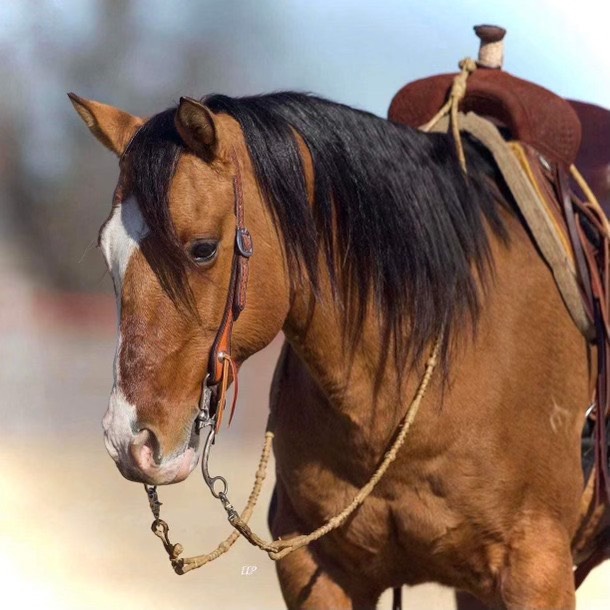Last updated on October 8, 2024
Horse Behavior and Gut Health: What You Need to Know
There’s been a lot of research in recent years about the importance of a healthy gut in horses. We know that an unhealthy gut can lead to a multitude of health issues and not just colic. Recently researchers have found that horse gut health has a direct correlation to horse behavior.
Gut Brain Axis

The gut microbiome affects the endocrine system that produces hormones and neurotransmitters. This connection is called the gut-brain-axis and is responsible for your horse’s behaviors, moods, and emotions. [1] If there is an overgrowth of harmful bacteria in the gut, behaviors can become more reactive and skittish. A French study in 2015 showed that “in horses, changes in behavior appear to be linked with changes in the gut microbiota.” [2]
So what does this mean for you and your horse? If your horse has had a change in behavior, or is so high-strung that all the calming supplements in the world don’t seem to help, it might be time to focus on their gut health. For calm, manageable horse behavior, you need a calm, healthy horse gut. Please keep in mind we are NOT veterinary professionals, just really passionate about equine gut health. Here are three easy ways to improve your horse’s gut health that will lead to better horse behavior.
Better Horse Behavior Starts with a Healthy Gut
1. Feed a High Fiber/Low Starch Diet
- high starch diets have been found to increase harmful bacteria in the gut, and mess with the pH balance of the digestive system. This not only increases acid levels (which can lead to ulcers), but may cause agitation and increased stress in the horse. [3]
- make sure your horse is getting a high fiber forage throughout the day, and not too much feedstuff
- performance horses need starches for their explosiveness, but too much can have a negative effect on their health and behavior. Work with your veterinarian to maintain a healthy balance.

2. Reduce Stressors When Possible
- stress and anxiety can reduce the rate of digestion, causing a change in the microbes and blood flow to the digestive tract. This can lead to an overgrowth of pathogenic bacteria and inflammation, setting off a chain of health issues. [4]
- be conscious of exercise, travel, and competition schedules. Horses can get overworked and burnt out just like humans can.
- allow as much turn out time as possible and make any changes to their routine/arrangements/schedule slowly. Horses are creatures of habit and usually don’t like new things to suddenly appear.
- use In The Zone paste during stressful situations to help reduce nervousness. ITZ has nutrient-rich, all natural ingredients that coat the stomach lining and prevents an excess of stomach acid. It promotes gut health and a calm state of mind.
3. Use Animal Element Supplements
- NuTrack Digestive Support contains 14 amino acids that promote digestion and helps improve gut health.
- it helps flush out the digestive tract, getting rid of any harmful buildup and allowing the healthy microbes to grow.
- to read more about WHY you should be using NuTrack, read this blog.
- Foundation Daily Detox is another must have for your feeding program. FDD safely cleanses the body of toxin buildup, allowing for the digestive system to work properly.
- we firmly believe that detoxing is vital to not only horse health, but horse behavior as well. We write about it in more depth here.
Gut Health is the Key to Horse Behavior

The state of your horse’s gut health controls almost every function of their body and mind: immune system, endocrine system, mental state & behaviors. At the root of it all, if their gut doesn’t feel well their behavior will reflect that. A tight cinch on an ulcer would cause anyone to kick and pull away. An uncomfortable belly doesn’t really make you want to run and compete to the best of your ability. A fluttering feeling deep in your stomach makes you feel anxious and unsure.
The key to good horse behavior is to make sure their gut is healthy and taken care of. Getting a healthy gut is as simple as going back to the basics: a high quality, high fiber diet, reduced stress factors, and top-tier supplements. Of course if you suspect there is a deeper issue, please don’t hesitate to consult with your vet. And remember: happy gut = happy horse.
All content is for informational purposes only. Please consult with your veterinarian. Proudly written for Animal Element by the team at FaithHanan.com
Resources:
- Loving, Nancy. “Gut Health and Horse Behavior: What’s the Connection?” September, 2022. Stablemanagement.com, https://stablemanagement.com/articles/gut-health-and-horse-behavior-whats-the-connection/
- Oke, Stacy. “Horse Behavior and the Microbiome: What’s the Connection?” February, 2023. The Horse. https://thehorse.com/1106463/horse-behavior-and-the-microbiome-whats-the-connection/
3 & 4. Loving, Nancy. “Gut Health and Horse Behavior: What’s the Connection?” September, 2022. Stablemanagement.com, https://stablemanagement.com/articles/gut-health-and-horse-behavior-whats-the-connection/

